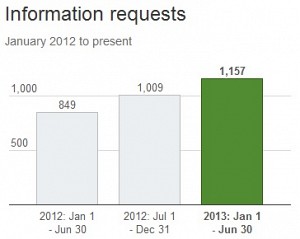James Delingpole had far too much fun writing this column:
You may be aware that David Cameron — as part of a secret, Lynton Crosby-inspired operation codenamed Suck Up Shamelessly To The Embittered Authoritarian Killjoy Harpies At Mumsnet — has decreed that as from next year the default option when you sign a contract with your new internet provider will be ‘No porn in this household, thank you. I think it’s a disgrace.’
Superficially (and does this coalition ever think any other way?) I can see this makes a lot of sense. After all, what do a growing national debt, falling living standards, rising inflation, skyrocketing energy prices, out-of-control immigration, Weimar-style money-printing, a burgeoning new housing bubble, a failed health service and a collapsing infrastructure matter when you’ve got the most important problem of our times, so to speak, in hand, viz. blokes sneaking a quick one off the wrist while their missus has popped down to Waitrose to stock up on Mabel Pearman’s Burford Brown eggs, Isigny Ste Mere unsalted butter and that Duchy Originals cider on special offer at just £1.45 a bottle?
According to James, nowadays women are about as likely to go looking for pornography on the internet as men are:
But according to some of my techie friends, this isn’t the case at all. They’re the ones who have to clear up all the viruses which you accidentally invited into your computer along when you were trying to Google the weather and mistakenly typed in ‘Romanian donkey babes xxx hardcore’ instead.
Here’s what one of them has to say: ‘The very worst I came across was a shared houseful of young ladies. It took over eight hours to do just the first pass with the antivirus software. That pass removed over 58,000 pieces of malware and spyware, and just under 2,000 viruses. It took all the next day to finish cleaning their computer. I told them it was the worst case of an infected computer I had ever come across, and one asked how it had happened for it to be so bad. Easy I said. Porn sites. They all went bright red and then the hilarity ensued, as the finger pointing started.’
[…]
I realise, of course, that there are still plenty of puritans out there who feel differently. To them I quote first Thomas Sowell: ‘What is ominous is the ease with which some people go from saying that they don’t like something to saying that the government should forbid it. When you go down that road, don’t expect freedom to survive very long.’ And second, Pastor Niemoller: ‘First they came for the wankers…’.

 You know you’ve arrived as an online media operation when governments take an interest in who is speaking out, and make efforts to muzzle what’s published. That’s definitely the case with Twitter, the microblogging platform that started as an outlet for exhibitionist ADHD sufferers, only to become a powerful medium for sharing news and grassroots organizing. According to the company’s latest transparency report, governments around the world are issuing ever-more demands for information about the service’s users, and stepping up efforts to suppress tweeted content.
You know you’ve arrived as an online media operation when governments take an interest in who is speaking out, and make efforts to muzzle what’s published. That’s definitely the case with Twitter, the microblogging platform that started as an outlet for exhibitionist ADHD sufferers, only to become a powerful medium for sharing news and grassroots organizing. According to the company’s latest transparency report, governments around the world are issuing ever-more demands for information about the service’s users, and stepping up efforts to suppress tweeted content.


